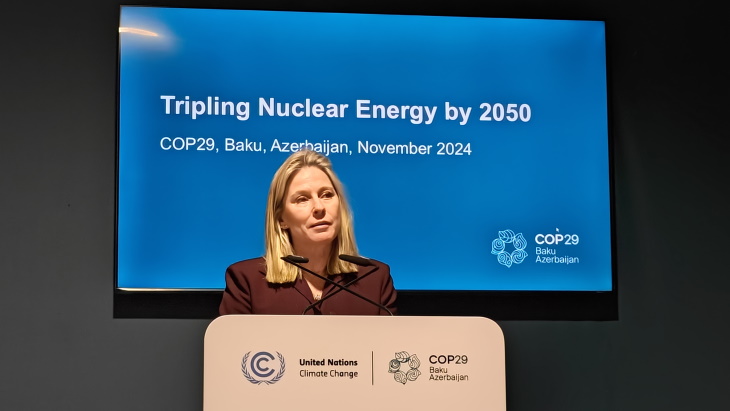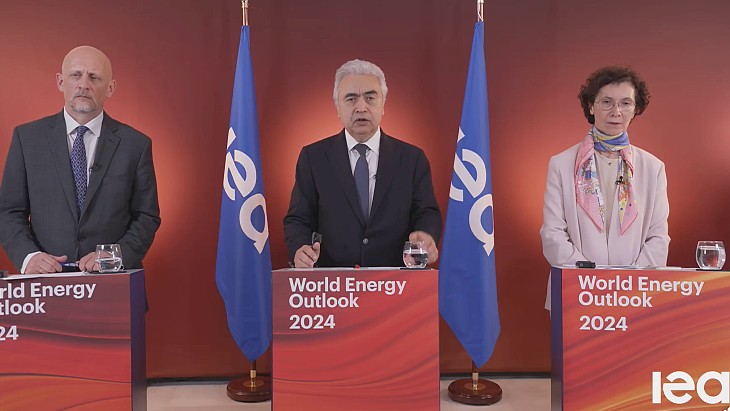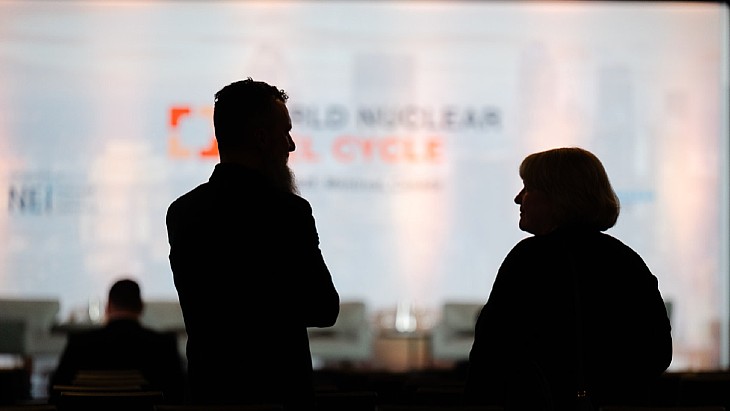Nuclear to be part of US clean hydrogen hubs
.jpg)
The seven hubs will be funded under the Bipartisan Infrastructure Law to kickstart a national network of clean hydrogen producers, consumers, and connective infrastructure while supporting the production, storage, delivery, and end-use of clean hydrogen, according to the Department of Energy (DOE). Known as H2Hubs, it is expected that they will collectively produce 3 million tonnes of hydrogen annually, reaching nearly a third of the 2030 US hydrogen production target and lowering emissions from hard-to-decarbonise industrial sectors, and resulting in a reduction of 25 million tonnes of end-use carbon emissions each year.
The selected hubs, their regions and the amounts they are to receive are:
- Mid-Atlantic Hydrogen Hub (Mid-Atlantic Clean Hydrogen Hub (MACH2) covering Pennsylvania, Delaware, New Jersey), which plans to develop renewable hydrogen production facilities from renewable and nuclear electricity using both established and innovative electrolyser technologies (up to USD750 million)
- Appalachian Hydrogen Hub (Appalachian Regional Clean Hydrogen Hub (ARCH2) covering West Virginia, Ohio, Pennsylvania), which will leverage natural gas to produce low-cost clean hydrogen and permanently and safely store the associated carbon emissions (up to USD925 million)
- California Hydrogen Hub (Alliance for Renewable Clean Hydrogen Energy Systems (ARCHES) covering California) which will leverage clean energy technology to produce hydrogen exclusively from renewable energy and biomass and provide a blueprint for decarbonising public transportation, heavy duty trucking, and port operations (up to USD1.2 billion)
- Gulf Coast Hydrogen Hub (HyVelocity Hydrogen Hub covering Texas), which plans large-scale hydrogen production through both natural gas with carbon capture and renewables-powered electrolysis (up to UDS1.2 billion)
- Heartland Hydrogen Hub (Minnesota, North Dakota, South Dakota) plans to use regional energy resources - including nuclear - to help decarbonise fertiliser production, decrease the regional cost of clean hydrogen, and advance the use of clean hydrogen in electricity generation and for cold climate space heating (up to USD925 million)
- Midwest Hydrogen Hub (Midwest Alliance for Clean Hydrogen (MachH2) covering Illinois, Indiana, Michigan) plans to produce hydrogen by leveraging energy sources including renewable energy, natural gas, and nuclear energy to enable decarbonisation through strategic hydrogen uses including steel and glass production, power generation, refining, heavy-duty transportation, and sustainable aviation fuel (up to USD1 billion)
- Pacific Northwest Hydrogen Hub (PNW H2 covering Washington, Oregon, Montana) plans to produce clean hydrogen exclusively from renewable sources through an anticipated widescale use of electrolysers, which will play a key role in driving down electrolyser costs, making the technology more accessible and reducing the cost of hydrogen production (up to USD1 billion)
The announcement is one of the largest investments in clean manufacturing and jobs in history, the White House said, with the federal investment being matched by recipients to leverage a total of nearly USD50 billion to strengthen local economies, create and maintain high-quality jobs and slash emissions.
"Unlocking the full potential of hydrogen - a versatile fuel that can be made from almost any energy resource in virtually every part of the country - is crucial to achieving President Biden's goal of American industry powered by American clean energy, ensuring less volatility and more affordable energy options for American families and businesses," Granholm said.
Integral nuclear
Constellation Energy, which earlier this year began operating a first-of-its-kind 1 MW demonstration scale, nuclear-powered clean hydrogen production facility at the Nine Mile Point nuclear power plant in New York state, is a major participant in the MachH2 hub. The company said it will use a portion of the hub funding to build the world's largest nuclear-powered clean hydrogen production facility at its LaSalle Clean Energy Center in Illinois.
The facility will cost an estimated USD900 million, a portion of which will be offset by the MachH2 award, Constellation said, and will employ lessons learned from from Nine Mile Point. The project will produce an estimated 33,450 tonnes of clean hydrogen per year and create thousands of "good-paying" jobs.
Constellation President and CEO Joe Dominguez said tax credits such as those contained in the Inflation Reduction Act - allowing hydrogen production using carbon-free power from existing nuclear power plants - are vital if such projects to go ahead. "Today's award is proof positive that DOE and the administration want existing nuclear energy to play a vital role in jumpstarting domestic hydrogen production and we look forward to final Treasury Department guidance," he said.
Xcel Energy, part of the Heartland Hydrogen Hub, said it expects to receive a large portion of the federal award, subject to negotiations. In its application, the company proposed investing up to USD2 billion over a decade for clean hydrogen-producing equipment and infrastructure and plans to use its existing and future nuclear, solar and wind resources in the Upper Midwest to produce hydrogen to blend into power generation, existing natural gas distribution systems, and agricultural and industrial applications. The company owns and operates two nuclear power plants in the region, a single boiling water reactor at Monticello and two pressurised water reactors at Prairie Island.
"Clean fuels are a critical component of enabling economy-wide decarbonisation. The Heartland Hydrogen Hub is a game-changing initiative that demonstrates how we're accelerating the development of the next generation of clean energy technology with significant benefits for our customers and the environment," said Xcel Energy Chairman, President and CEO Bob Frenzel.
Maria Korsnick, president and CEO of the Nuclear Energy Institute, said the announcement was a "pivotal starting point" for nuclear energy's integral role in achieving clean hydrogen goals. "We are thrilled to see nuclear energy included in these hydrogen hub announcements," she said.
"With 93 existing nuclear reactors already responsible for nearly half of the nation’s carbon-free electricity, the potential for nuclear energy to shape our clean hydrogen future is immense. For instance, just ten of our existing reactors could produce approximately 1.5 million tons of clean hydrogen annually, equivalent to 15% of the total clean hydrogen required in the United States by 2030 to put us on track for net-zero by 2050. A clean hydrogen future is going to need nuclear," she added. "Continued investments in both our current and future nuclear fleet are essential to harness nuclear's potential to significantly advance clean hydrogen objectives."

_99697.jpg)








_50521.jpg)

